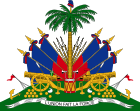
The government of Haiti is a semi-presidential republic, a multi-party system wherein the President of Haiti is head of state elected directly by popular elections. The Prime Minister acts as head of government and is appointed by the President, chosen from the majority party in the National Assembly. Executive power is exercised by the President and Prime Minister who together constitute the government. Legislative power is vested in both the government and the two chambers of the National Assembly of Haiti. The government is organized unitarily, thus the central government delegates powers to the departments without a constitutional need for consent. The current structure of Haiti's political system was set forth in the Constitution of March 29, 1987.
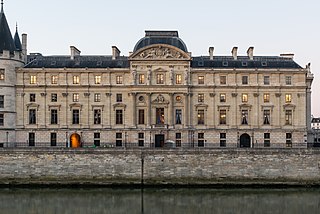
The Court of Cassation is the supreme court for civil and criminal cases in France. It is one of the country's four apex courts, along with the Council of State, the Constitutional Council and the Jurisdictional Disputes Tribunal.

The president of Haiti, officially called the president of the Republic of Haiti, is the head of state of Haiti. Executive power in Haiti is divided between the president and the government, which is headed by the prime minister of Haiti.[A133] The Transitional Presidential Council has been exercising the powers of the presidency since 25 April 2024. It has a mandate to act that concludes on 7 February 2026.

The Constitutional Council is the highest constitutional authority in France. It was established by the Constitution of the Fifth Republic on 4 October 1958 to ensure that constitutional principles and rules are upheld. It is housed in the Palais-Royal in Paris. Its main activity is to rule on whether proposed statutes conform with the Constitution, after they have been voted by Parliament and before they are signed into law by the President of the Republic, or passed by the government as a decree, which has law status in many domains, a right granted to the government under delegation of Parliament.

The State University of Haiti is one of Haiti's most prestigious institutions of higher education. It is located in Port-au-Prince.

Ertha Pascal-Trouillot is a Haitian politician who served as the provisional President of Haiti for 11 months in 1990 and 1991. She was the first woman in Haitian history to hold that office and the first female president of African descent in the Americas.
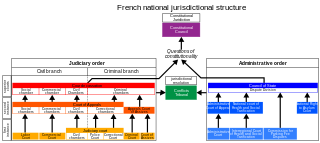
French law has a dual jurisdictional system comprising private law, also known as judicial law, and public law.

The Court of Cassation of Belgium is the supreme court of the Belgian judiciary. The court is composed of thirty judges with life tenure who are nominated by the High Council of Justice of Belgium and appointed by the Belgian federal government. The court handles cases in the two main languages of Belgium, Dutch and French, and provides certain facilities for cases in German. The court is assisted in its work by a public prosecutor's office and a bar association, which both function separately from other structures. The duty of the public prosecutor's office is to provide advisory opinions to the court on how the law ought to be interpreted and applied. The attorneys of the court's bar association assist litigants in proceedings before the court; in certain cases, their assistance is mandatory.

In most legal jurisdictions, a supreme court, also known as a court of last resort, apex court, and highcourt of appeal, and court of final appeal, is the highest court within the hierarchy of courts. Broadly speaking, the decisions of a supreme court are binding on all other courts in a nation and are not subject to further review by any other court. Supreme courts typically function primarily as appellate courts, hearing appeals from decisions of lower trial courts, or from intermediate-level appellate courts. A supreme court can also, in certain circumstances, act as a court of original jurisdiction.
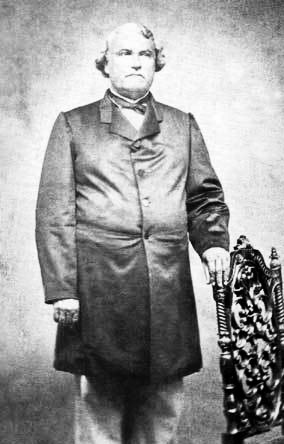
Thomas Madiou was a Haitian historian. His work Histoire d'Haïti is the first complete history of Haiti from 1492 to 1846. It is considered one of the most valuable documents of Haitian history and literature.

The Supreme Court is the highest civil and criminal court in Burundi. It has nine members, including the Court President, who are nominated by the Judicial Service Commission and appointed by the President of the Republic after the approval of the Senate. The court's president is referred to as the Chief Justice.
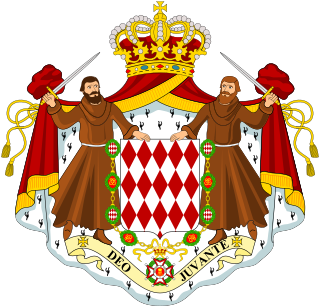
The Monegasque Supreme Court is the highest court of law in the city-state of Monaco for judicial appeals, administrative matters as well as ensuring the constitution of Monaco is upheld. It consists of three full judges and two assistant judges, appointed by the Prince of Monaco at the recommendation of the National Council of Monaco, the Crown Council, the Council of State, the Court of First Instance and the Court of Appeal. This is done in the ratio of one judge per institution. The Supreme Court was established in 1962 following the new constitution to guarantee fundamental liberties.

Lyonel Trouillot is a novelist and poet in French and Haitian Creole, a journalist and a professor of French and Creole literature in Port-au-Prince.

Patriotic Unity, is a political party in Haiti founded on 28 November 2009. Its dissolution had been claimed by former leading members on 30 April 2019 but was then disputed by the current leadership. Its founder and leader was René Préval, who served as President of Haiti from 2006 to 2011.

The Supreme Court of the Dominican Republic is the highest court existing in the Republic and is, therefore, the head of the judiciary in the country.
René Sylvestre was a Haitian jurist and lawyer. He had served as Chief Justice of the Supreme Court of Haiti from February 2019 until his death.
Rapporteur Judge or Rapporteur-Judge is a term for number of judicial officials similar to judicial assistant at highest court, usually functioning as rapporteur while having status equivalent to lower ordinary court judges.

